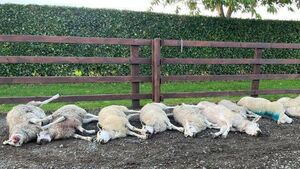Brutal dog attack leaves pet sheep dead on farm

Eleven sheep were massacred in the dog attack on the Reddy farm
A DEVASTATING dog attack on a flock of 25 sheep belonging to James and Margaret Reddy in Templepeter has left 11 animals dead, including several that were family pets, prompting calls for urgent changes to current legislation.
The brutal assault, which occurred last Wednesday morning on farmland near The Fighting Cocks, saw dogs drive the terrified sheep into a river and ditches. When farmer James Reddy discovered the carnage of the dead and dying animals, several had to be euthanised on the spot due to the severity of their injuries.
“We were crying, putting down the sheep,” said Kathy Reddy, daughter of the sheep owners.
“Their injuries were so bad that they had to be put down; they were going to die anyway,” she added.
The attack was particularly vicious, with the dogs ripping the jaws completely off several sheep. Along with the 11 dead, four others suffered serious wounds, two of whom may not survive.
“Apparently sheep turn around when they’re being attacked and face the attacker. Their lower jaws had been bitten off,” Ms Reddy explained. “The ones who survived have bite marks to their face and quite deep scratches.”
Both gardaí and the family’s vet believe multiple dogs were responsible for the attack. “The vet is adamant that it’s more than one dog,” Ms Reddy confirmed.
The veterinarian, who is in his seventies and has served the farm for years, told the family that while he might see one dog attack per year, this incident was particularly brutal.
The search for the scattered flock proved harrowing for the family.
“We were in the field from about half-nine in the morning until half-three in the pouring rain trying to locate the sheep. We didn’t know where half of them were,” Ms Reddy recounted.
When gardaí arrived to assist, they were shocked by what they witnessed.
“They could see the blood, they could see everything. The guards were horrified. One of them said she couldn’t look at it,” Ms Reddy said.
The attack has left lasting trauma on both the family and their surviving animals. “I don’t think we’ll ever forget it; you’d never forget it,” she said.
The remaining sheep are in shock and have been moved to a field directly in front of the Reddy house, while all other flocks have been brought closer for protection.
Ms Reddy expressed deep concern about future attacks.
“When dogs taste blood, they’ll come back again and again,” she warned. “When the sheep were put down, you could see the extent of the injuries underneath, so the dogs had been in the field for a while.”
The family had suspected that their sheep were being worried by dogs prior to the fatal attack, but current legislation prevents authorities from acting without direct evidence.
“The law probably doesn’t go far enough in that suspected dogs can’t be seized so that gardaí could do DNA testing or something like that,” Ms Reddy said.
Despite contacting the dog warden previously about their sheep being worried in their field, no action could be taken.
“They can effectively do nothing unless the dog has been seen in the field or videoed in the field,” she explained.
Ms Reddy believes dog owners must be aware when their animals have been involved in such attacks. “You couldn’t be blind to the fact that your dog came back soaking wet, covered in muck and blood.”
The incident has caused significant financial loss and immense emotional trauma for the family, who regarded many of the sheep as pets.
Four animals had been hand-reared and given names, and some were regularly brought to the Tullow Show by Mr Reddy’s nephews.
“The sheep are part of your family; you’re so invested in caring for them,” Ms Reddy explained.
She criticised attitudes that diminish the value of farm animals.
“I think people think that the animal is valueless and ‘oh, dogs just ran a few sheep, they’ll be all right’. I think that’s part of the attitude as well, that there’s no value in them and that they’re stupid animals.”
Ms Reddy is now calling for changes in legislation to allow for the seizure and testing of suspected dogs, giving authorities greater power to investigate such incidents and to hold dog owners accountable for their animals’ actions.




